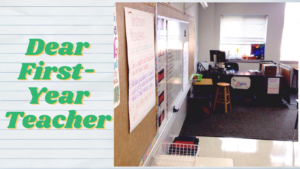
Dear First-Year Teacher,
Welcome to a profession where you are about to embark on the most creative, challenging, rewarding, and emotionally exhausting journey. I know, I was you almost a decade ago. There was so much to learn and do over the first summer before starting Day 1 that it seemed too overwhelming.
I am for you, First-Year Teacher! I am here to let you know that you don’t have to have it all figured out on Day 1. In fact, here are 4 things I wish I would have known going into my first year:
One: It’s okay if your classroom’s walls are blank!
Your classroom really isn’t your classroom. It’s the room that you will share life with 20+ other people. Focus on what will set you and your students up for success on your first day:
-Is the flow of the room intuitive? Are you and your kids able to move about in a way that makes sense? If you teach younger students, walk around on your knees to view the room how they would view it. Change it up to meet their needs.
-Agendas and objectives are in clear and consistent locations.
-Bulletin boards have neat coverings (fabric or butcher paper) but are blank.
My friend, allow your students to co-create the room with you! Have an inviting space that says, “Your input is valuable. This is your room, too!”
Two: Simple is Better
Looking back, I can’t believe how much plastic I wasted on laminating items that didn’t really need to be laminated. Instead, I would caution you to carefully consider what items you bring into your room or what you require students to bring into their room.
Ask yourself the following question, “What classroom materials do we actually need to make learning happen?”
Now is not the time to create cute folders, notebooks, or hundreds of center bins. Save that for your second year when you really have a grasp on your content and class structure.
My First-Year Teacher friend, focus on what matters most and don’t compare yourself to someone who’s been teaching 5+ years! I guarantee their first year was as basic as I’m encouraging you to be.
Three: Teaching is a Marathon – Pace Yourself and Run Your Own Race
This one’s for my elementary friends or anyone teaching multiple subjects. Lesson plan to the best of your ability for all subjects you teach, but don’t do a deep dive into each one. Rather, pick 1 subject to really dive deep into this year. For me, it was math. I spent more hours planning each math lesson than the other subjects I taught. By year 2, I had well-written math plans and could focus my energy on diving deeper into writing.
I view this kind of like the snowball method of paying off debt. It goes something like this: pay minimum payments on all your debt. Then, any extra money goes towards your smallest debt until it’s paid off. After it’s paid off, put what you had been paying and any extra on the next smallest debt. It’s not about the math, it’s about the feeling of success with each win that keeps you going.
This is how it is with lesson planning your first year. Plan everything and accept that it won’t all be picture perfect. Take the “smallest” subject and put more energy into it your first year. Enjoy the feeling of success with smaller wins in the lesson planning process!
Again, my First-Year Teacher friend, become good friends with contentment. Save your creative juices so that you don’t burn out 5 years into your teaching career.
Four: Focus on the First 2 Weeks
My final piece of advice will set you up for success this school year, but you must promise to follow it! Really plan out your first 2 weeks of the school year. I even recommend having your plans ready by the middle of July.
Practice your plans. Practice moving throughout the classroom as if it were the first day. Record yourself practicing your first 2 weeks.
These 2 weeks make or break a school year. I can attest to this since I’ve been on both ends of the spectrum! When clear procedures and routines are in place, practiced, practiced, and practiced, the rest of the year will run so much smoother for you and your students.
If you’re worried about your curriculum, use pieces of it to help reinforce your procedures and routines. Don’t be afraid to go slow in order to go fast later in the year.
Here’s another running analogy for you: at the start of the race, the best runners stick to their plan or even start out slower. They know that energy needs to be saved for the last mile kick of the race.
You are running the teaching race. The beginning of the year is the time to stick to the plan step-by-step. It’s the time to start slower than you think, because you’ll need it for the low parts of the year and the final kick at the end of the year.
After the first 2 weeks, you can ease up a bit on your detailed lesson planning. You might not need to script everything you say, but I highly recommend doing so for your first 2 weeks.
A final word…
There are many more things to write about concerning the first year of teaching. My hope is that these few ideas will get you started and relieve some of your anxiety.
Remember, you’ve got this! Your school community is there to support you during your time as a teacher. If that’s not your situation, then join a community of educators either in your city or online. This is not the time to isolate or do it on your own. Seek out mentors and trusted educators to walk alongside you as you prepare for your first year.
Welcome to your first year of teaching!
